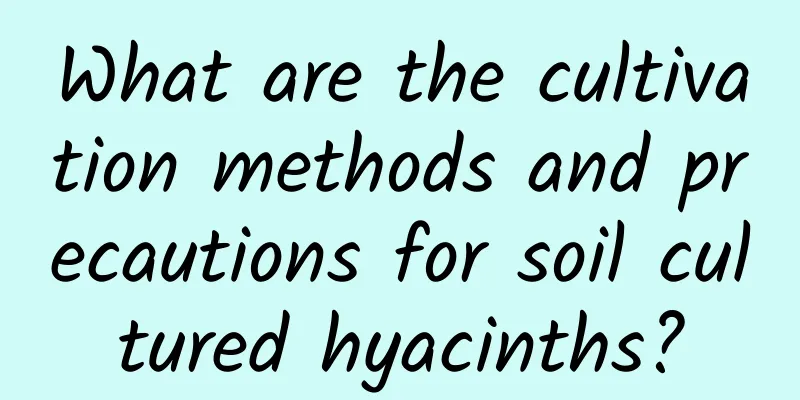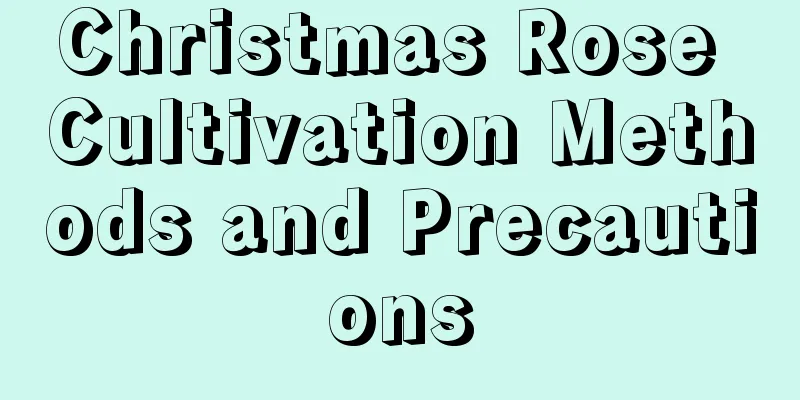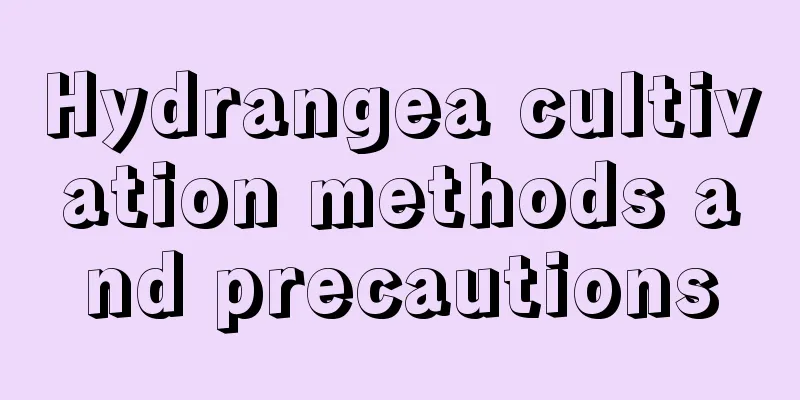What are the cultivation methods and precautions for soil cultured hyacinths?

Soil culture hyacinth cultivation methodHyacinthus is a plant of the Hyacinthaceae family. The main methods of reproduction are division and sowing. It is a perennial bulbous plant. Its outer skin is purple-blue or white. When not in bloom, it is shaped like garlic, with narrow lanceolate and thick leaves. Soil-grown hyacinths prefer a growing environment with plenty of sunlight, warmth and humidity. They are suitable for maintenance under bright diffuse light. They like loose, fertile, well-drained sandy loam. In a suitable environment, soil-grown hyacinths can grow all year round and grow very fast. temperatureSoil-grown hyacinths are not resistant to high temperatures. If the temperature exceeds 35 degrees, the blind flower rate will increase. If the temperature is too low, the flower buds will be damaged by frost. During normal maintenance, the temperature needs to be adjusted appropriately to promote the growth of the plant. illuminationHyacinth likes an environment with plenty of sunlight. If the light is too weak, it will cause the plant to be weak, the stems to be too long, the flower buds to be small, the flowers to wither early, and the leaves to turn yellow. However, if the light is too strong, it will also burn the leaves and petals, shortening the flowering period. soilHyacinth is suitable for planting in well-drained, fertile, high in organic matter, good in aggregate structure, and neutral to slightly alkaline soil. You can mix leaf mold, garden soil, coarse sand, and bone meal to prepare the soil. The soil needs to be disinfected in advance before use. WateringSoil-grown hyacinths like a humid environment and need to be watered frequently to keep the soil slightly moist. However, the plants are not tolerant to waterlogging and water accumulation is not allowed, otherwise it will cause root rot. Control watering during the low temperatures in winter to keep the soil slightly dry. FertilizationHyacinths grown in soil are more resistant to fertilizer. During the growth period, you can apply thin liquid fertilizer once every half a month to promote its rapid growth and early formation. When applying fertilizer, be sure to dilute it with water. Do not apply concentrated fertilizer directly, which will burn the roots and affect growth. pruneThe yellow and dead leaves of hyacinths grown in soil can be trimmed at any time, especially the yellow leaves at the bottom need to be cleaned up in time to increase the ventilation and light transmittance of the plants. This can reduce the occurrence of diseases and pests and is conducive to the healthy growth of the plants. Precautions for soil culture of hyacinthIf hyacinth is not properly maintained, it may develop soft rot, sclerotinia and viral diseases. The soil needs to be disinfected and sprayed with thiophanate-methyl or benomyl once a week during the growth period to inhibit the spread of pathogens. Watering should be appropriate, ventilation management should be strengthened, and centrally diseased plants should be removed in time to significantly reduce the incidence rate. |
<<: What are the cultivation methods and precautions of Aspidistra
>>: What are the cultivation methods and precautions of Rieger Begonia
Recommend
How to grow camellia so that it blooms
Camellia flowering time Camellias usually bloom i...
Contraindications of Houttuynia cordata: Can pregnant women eat it?
1. Taboo 1. Don’t eat too much: Houttuynia cordat...
The cultivation methods and precautions of wheat plum
1. Maintenance methods 1. Temperature: When the t...
White flowered plants
1. Gardenia Gardenia is an evergreen shrub of the...
Ruogeshi family breeding methods and precautions
Farming methods temperature The suitable temperat...
How to fertilize Tiger Pilan
Time of fertilization When planting Sansevieria, ...
Which month should strawberries be planted?
Strawberry is a very common fruit. Its fruit is b...
Common diseases and pests of Prunus mume and their control methods
Common diseases of five-color plum: gray mold Sym...
How long does lucky bamboo need to be before it can be placed in a vase? Can stones be placed in a vase?
1. How long does it take to put it in the bottle?...
What should I do if the leaves of the swallowtail palm fall off?
1. Excessive watering 1. Reason: If you water you...
Reasons and treatments for yellow leaves of moonflower
1. Temperature discomfort Reason: The temperature...
How long does it take for a Venus flytrap to open? Why doesn't it open?
1. Opening time The clamps of the Venus flytrap w...
How to prune a pomegranate tree and when and how to prune
Pomegranate tree pruning time Pomegranate trees n...
Autumn cucumber sowing method and sowing time
Depending on the climatic conditions of different...
When is ginger harvested and in which month is it put on the market in large quantities?
Ginger harvest time Young ginger can be supplied ...









